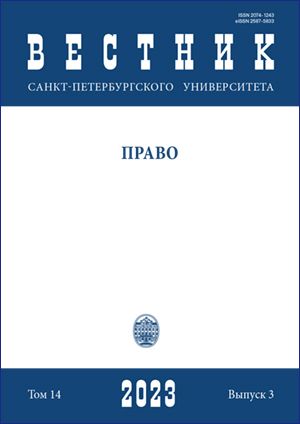Правовые аспекты ответственности за отрицание Холокоста в России (на примере судебного дела Романа Юшкова)
DOI:
https://doi.org/10.21638/spbu14.2023.303Аннотация
В работе анализируются такие проблемы, как отрицание Холокоста и свобода слова, в контексте судебного дела Романа Юшкова, разместившего в одной из социальных сетей ссылку на статью, где утверждалось, что количество жертв Холокоста сильно преувеличено и значительно ниже 6 млн чел. Роману Юшкову было предъявлено обвинение по ст. 282 (ч. 1) и ст. 3541 (ч. 1) Уголовного кодекса РФ (отрицание фактов, установленных Международным военным трибуналом). Суд присяжных вынес оправдательный приговор, приняв сторону защиты, говорившей о намерениях Романа Юшкова вызвать общественную дискуссию о количестве жертв Холокоста. Верховный Суд России оставил оправдательный приговор в силе. Автор статьи рассматривает историю и развитие отрицания Холокоста, исследует отечественное и зарубежное законодательство, криминализирующее отрицание Холокоста и других геноцидов, акцентирует внимание на ревизионистском направлении — отрицателях Холокоста, пытающихся пересмотреть историю, чтобы отразить ранее неизвестные факты или предоставить менее предвзятую, с их точки зрения, информацию. Ревизионизм — академический подход, признающий, что традиционные нарративы истории могут быть не совсем точны и поэтому должны пересматриваться по мере появления новой информации. Во всем мире действует законодательство, криминализирующее отрицание Холокоста или иного геноцида, пропаганду нацистской идеологии через речь, символику или общественные объединения, цель которого — попытка предотвратить любое публичное возвращение нацизма. В статье указывается, что в данной области существуют четыре типа правовых режимов с точки зрения указанного состава преступления. Большинство стран Европейского союза (а также Израиль и Российская Федерация) криминализируют отрицание геноцида. Однако, несмотря на угрозу уголовного преследования, отрицание Холокоста приобрело особое значение в сети Интернет. В статье делаются выводы о противоречивости российской правоприменительной практики, несовершенстве российской судебной системы, а также системы подготовки представителей юридических профессий.
Ключевые слова:
отрицание Холокоста, исторический ревизионизм, отрицание геноцида, реабилитация нацизма, международная судебная практика, российская судебная практика, свобода слова
Скачивания
Библиографические ссылки
Загрузки
Опубликован
Как цитировать
Выпуск
Раздел
Лицензия
Статьи журнала «Вестник Санкт-Петербургского университета. Право» находятся в открытом доступе и распространяются в соответствии с условиями Лицензионного Договора с Санкт-Петербургским государственным университетом, который бесплатно предоставляет авторам неограниченное распространение и самостоятельное архивирование.






